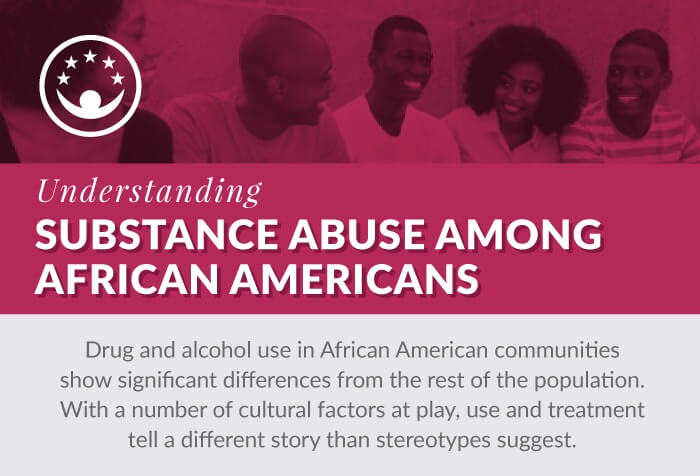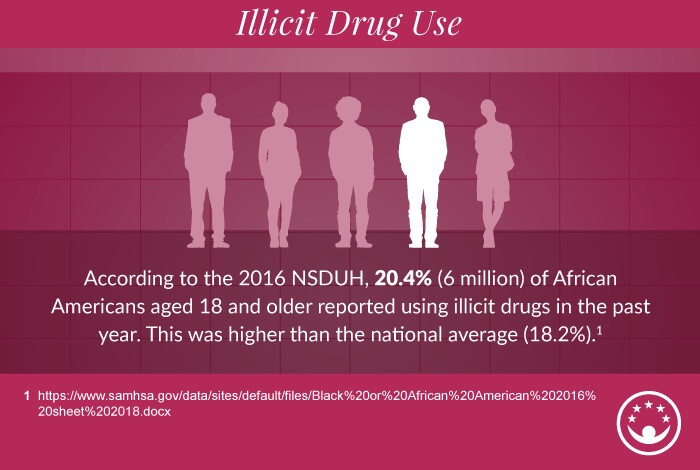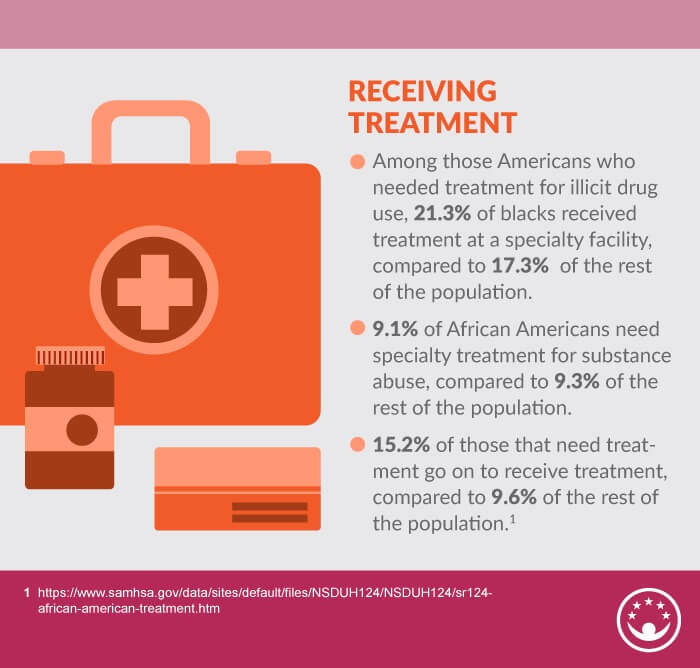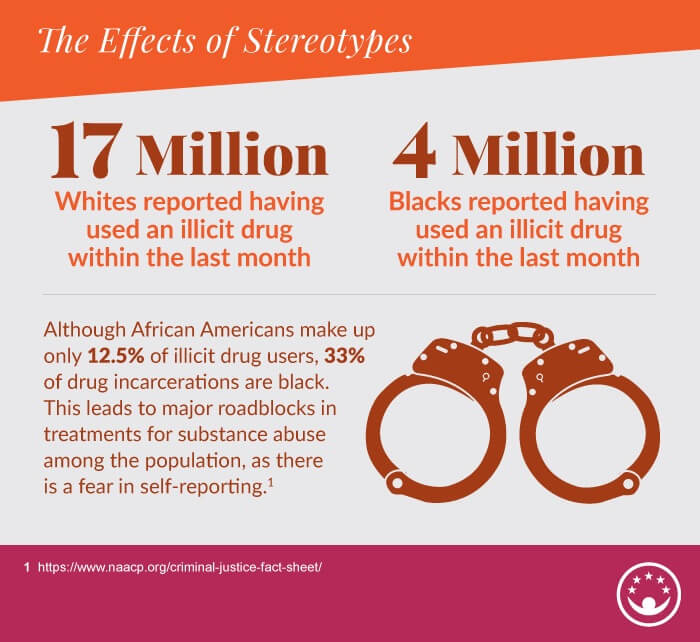Alcohol and Drug Use Among African Americans
The U.S. Bureau of the Census estimates that there are 44 million people of African origin living in the country, comprising 13.4% of the total population.1 African Americans are overrepresented among people that use drugs in the United States, but they are also more likely to seek treatment for their drug addiction.

Unfortunately, studies show that this population experiences less favorable outcomes upon the completion of substance use treatment. Here we will discuss the statistics of substance use among African Americans and explore treatment options and outcomes.
Substance Use Among African Americans
The rates of substance use among African Americans are similar to those of the general population, although there are some slight differences. Findings from the 2018 National Survey on Drug Use and Health include:2
- 6.9% of African Americans have a substance use disorder compared to a rate of 7.4% among the total population.
- 3.4% of African Americans have an illicit drug use disorder compared to a rate of 3% among the total population.
- Past month illicit drug use among African Americans (13.7%) is more than Caucasians (12%) and Hispanics (9.7%).
- Past month marijuana use among African Americans (12.2%) is higher than the general population (10.1%).
- African Americans report lower lifetime use of cocaine (8.5%) compared to Caucasians (17.6%) and Hispanics (11.1%).
- Alcohol use disorders are less common among African Americans (4.5%) than the total population (5.4%).
- Binge drinking among African Americans (23%) is slightly less common than in Hispanics (24.6%) and Caucasians (25.7%).
- The rate of heavy drinking among African Americans (4.3%) is much less than the general population (6.1%) and Caucasians (7.2%).
Although the rate of cocaine use among the African American population is much lower than the rest of the country, it is important to note that this statistic includes the use of both powder and crack cocaine.
Studies examining the use of specific forms of cocaine show that African Americans are more likely to use crack than any other ethnic group in the United States. A recent study indicates a much higher rate of lifetime crack cocaine use among African Americans (4.6%) compared to Caucasians (3.7%) and Hispanics (2.3%).3

Differences in Substance Use Patterns Across the Black Population
Research on substance use among Black Americans often combines Caribbean Blacks and African Americans into a single population, which does not provide a true picture of the substance use among these populations.
A recent study determined that there are differences in the patterns of substance use and dependence between African America and Caribbean Blacks. Some of the findings from this analysis include:4
- Rates of substance use are slightly higher for African Americans (11.5%) than for Caribbean Blacks (9.6%).
- Rates of substance use disorders are slightly higher for African Americans (4.9%) than for Caribbean Blacks (4.1%).
- Rates of substance use are higher among African American women (6.3%) than Caribbean Black women (2.8%).
- First-generation Caribbean Blacks are significantly less likely than African Americans to have a substance use disorder.

Treatment Options and Outcomes Among African Americans
The Substance Abuse and Mental Health Services Administration reports that African Americans are just as likely to need substance use treatment as any other population. A recent study found that 9.1% of African Americans and 9.3% of persons from other racial and ethnic groups are in need of treatment for drug or alcohol use.5
African Americans are less likely to need treatment for alcohol use (6.8% vs. 7.8%), although they are more likely to need treatment for illicit drug use (4.1% vs. 3.0%).
Although the rate of illicit drug use is higher among African Americans, statistics show that African Americans seek and receive specialty treatment for substance use problems at a higher rate than the rest of the population. Among individuals in need of substance use treatment, African Americans are more likely to receive treatment at a specialty facility (15.2% vs. 9.6% for individuals from all other ethnic groups).5 African Americans are also more likely to recognize the need and seek treatment (2.8% vs. 1.4%).

Unfortunately, research also shows that African Americans have lower rates of recovery from drug addiction following treatment.6 To better meet the treatment needs of the African American community, there are several social and cultural factors that should be considered. These include:
Program Staff
Cultural differences between providers and program participants can easily undermine the reception of treatment. A multicultural staff is most effective in providing substance use treatment, and programs treating African Americans benefit from having someone of color represented on the treatment team.7
Location
Programs should be provided in facilities that are easily accessible to the client. Studies have found that lack of transportation is one of the top reported barriers to treatment for African Americans.7
Spirituality
Spirituality and religion are key sources of strength among the African American population, and spirituality should be emphasized as a potential coping mechanism during treatment for African Americans. Studies have shown that spirituality among African Americans in recovery from substance use is associated with more positive outcomes.8
Get Help Today
Call a compassionate admissions navigator and begin the admissions process today. They can listen to your story, help you explore treatment options, and verify your insurance.


